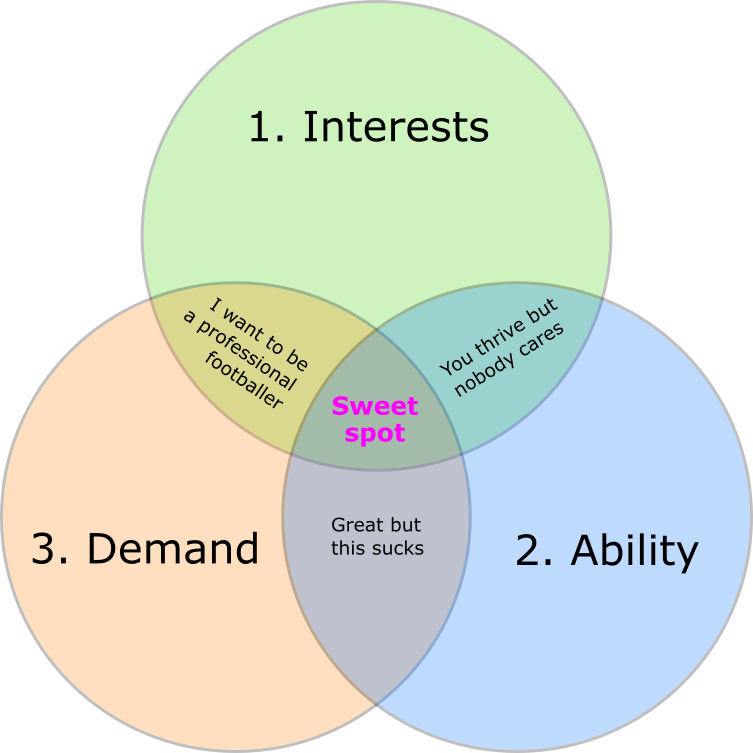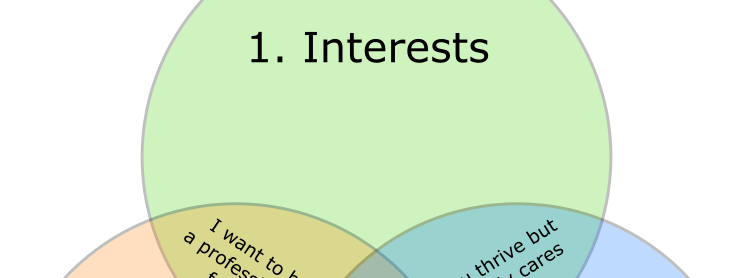We live in a competitive society. Young people are told about the importance of education and hard work, and how this will enable them to have the career, or even the life they want to have. Such advice is arguably quite vague and certainly does not capture all which is important. I grappled – and partly still do – with these questions of career and other things in life. The outcome of some of this pondering shall be the focus of this post. It aims to provide guidance of how the problem of one’s professional life can be approached. From experience, I found that young(er) people I told this always seemed to find it helpful.
If you have read my previous piece, you already figured that I like to analyse and then synthesise things. The approach here will be similar, though in a very different context.
So, what does matter for choosing our path in life? I argue it’s a combination about what we value ourselves and what others value we do. Why care about others in this respect? Because in almost any path we choose we will require the support of others at some point, be it being picked for a job, being promoted, having sufficient sales for my business, or getting the funding for my new business idea, etc. You could bluntly say that you have to pay your bills somehow, and somebody needs to be willing to give you the money for it.
Doing what others like you to do will likely lead to some form of success but may not be very fulfilling if you actually don’t like it. This means that what you choose to do ideally aligns with what you are interested in and what there is demand for. There is a third variable in this equation which is equally important: ability. Independent what I or other like me to do, I need to be able to do it. No point of wanting to become a professional football player, even if many people like to watch football, because they primarily like to watch the Messi’s of this world.
The three dimensions of personal interest, external demand and ability, and how they overlap are summarised in what I call the “Venn diagram of life” (VoL). You ideally hit the sweet pink spot in the middle, where you like your job, you are good at it, and others value what you do. Only having two of the three overlap may not cut it.

Here is how I approached the problem of choosing a subject for my university studies (physics) using early thinking about the VoL, where it was more about eliminating things I did not want to study. For instance, I was aware that studying law would be a safe choice (sufficient demand) and that I didn’t see a reason why I should not be able to do it (ability). However, I couldn’t move myself to read and memorise tons of what I perceived to be the driest texts on earth (interest), while I do have respect for people who do this – at least when they do something socially useful with it.
How to use the VoL more generally? I added an ordering to the three dimensions, and would go clockwise in the given order. That is, say you want to choose a subject to study, a new job, or an entirely new career, you first think about what interests you the most, what are the fields of study or work you want to get into and spend a substantial amount of your time in? Pick one, a list may be even better with a ranking.
Next, for each item of interest. Think hard about whether you either already have what it takes to do it, or if you have enough time, capability and grit to learn what it takes. If not, you may be better off discarding that idea. If yes, think about if and how others care about it. By thinking about this your ideas could be tweaked, potentially on the go, such that it is more appealing to others, while not straying too far from the original.
Here again is a personal example. I realised during my physics studies that trying to become a professor in the field I was in (theoretical particle physics) will most likely not be the best for me or the field.
However, when then wandering through my PhD I also figured out that the analysis of complex datasets can be fun, because insightful, can contribute to the public good (also very satisfying), and that there likely will be more demand for this in the future – at least I hoped so. This then actually made me ‘discover’ the world of central banking, where I have been doing data and machine learning stuff ever since. It is important to note that the demand component was very important here, as I joint such rather conservative institutions via a non-traditional path, i.e. not coming from a prestigious economics programme. So I incredibly relied on people’s belief in me and their support.
Back to the VoL, there are a couple of important points to add. First, all dimensions (interest, ability, demand) are not immutable: Personal interests change, I can learn new stuff, and the structure of society and the economy evolve, or are different in different places. This means, the VoL, can be applied repeatedly but also that the details of the analysis will change.
Second, everybody should also consider their preferences alongside the dimensions of interest, ability, and demand, and think about the resulting trade-offs. If I values money very much in life, but have little particular interests and are fairly capable of doing or learning things, I should orientate myself at salary league tables. However, if I am passionate about creating tiny art sculptures using an electron microscope, then I also have to consider that the market (i.e. demand) for this may be limited. But this does not mean that one should not pursue this path. Everybody will value each dimension differently.
Third, being able to apply the VoL freely likely puts you in a privileged position already. Many people across the world do not have the option to just “follow their passions” and then figure out the rest. For example, if by economic hardship you don’t see how your interest could matter for taking a decision, you still can think about your ability and what they are worth. Maybe some success helps you to choose freer later on.
Fourth and final, the VoL was primarily meant as a tool to help with professional or career development. That is, a very individualistically focused and narrow subject. However, career optimisation certainly is not everything. For everything else, you may just throw the external demand and ability parts overboard enjoy yourself and be happy.


Leave a Reply